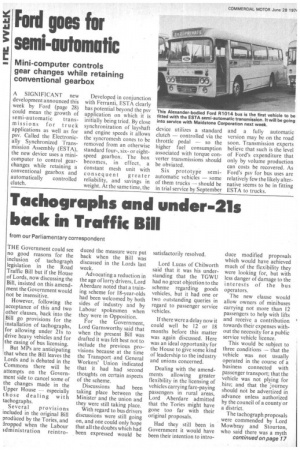Tachographs and under-21s back in Traffic Bill
Page 16

If you've noticed an error in this article please click here to report it so we can fix it.
from our Parliamentary correspondent
THE Government could see no good reasons for the inclusion of tachograph legislation in the Road Traffic Bill but if the House of Lords, now discussing the Bill, insisted on this amendment the Government would not be insensitive.
However, following the acceptance of this and two other clauses, back into the Bill go provisions for the installation of tachographs, for allowing under 21s to drive heavy vehicles and for the easing of bus licensing.
But MPs are anticipating that when the Bill leaves the Lords and is debated in the Commons there will be attempts on the Government side to cancel some of the changes made in the Upper House — especially those dealing with tachographs.
Several provisions included in the original Bill produced by the Tories, and iropped when the Labour tdministration reintro duced the measure were put back when the Bill was discussed in the Lords last week.
Advocating a reduction in the age of lorry drivers, Lord Aberdare noted that a training scheme for I 8-year-olds had been welcomed by both sides of industry and by Labour spokesmen when they were in Opposition.
For the Government, Lord Garnsworthy said that when the present Bill was drafted it was felt best not to include the previous provisions because at the time the Transport and General Workers' Union indicated that it had had second thoughts on certain aspects of the scheme.
Discussions had been taking place between the Minister and the union and they were still taking place.
With regard to bus drivers discussions were still going on, and one could only hope that all the doubts which had been expressed would be satisfactorily resolved.
Lord Lucas of Chilworth said that it was his understanding that the TGWU had no great objection to the scheme regarding goods vehicles, but it had one or two outstanding queries in regard to passenger service vehicles.
If there were a delay now it could well be 12 or 18 months before this matter was again discussed. Here was an ideal opportunity for the House to give some kind of leadership to the industry and unions concerned.
Dealing with the amendments allowing greater flexibility in the licensing of vehicles carrying fare-paying passengers in rural areas, Lord Aberdare admitted that the Tories might have gone too far with their original proposals.
Had they still been in Government it would have been their intention to intro duce modified proposals which would have achieved much of the flexibility they were looking for, but with less danger of damage to the interests of the bus operators.
The new clause would allow owners of minibuses carrying not more than 12 passengers to help with lifts and receive a contribution towards their expenses without the necessity for a public service vehicle licence.
This would be subject to three conditions -that the vehicle was not usually operated in the course of a business connected with passenger transport; that the vehicle was not plying for hire; and that the journey should not be advertized in advance unless authorized by the council of a county or a district.
The tachograph proposals were commended by Lord Mowbray and Stourton, who said there was a myth continued on page 17












































































































